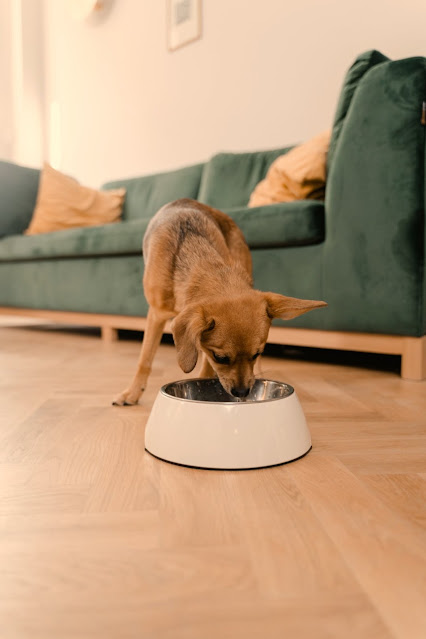07 Foods That Could Harm Your Dog:
Best to Avoid
Introduction
Dear All: Our canine friends hold a special place in our hearts,
and as responsible pet owners, we try to provide them with the best care
possible, including their diet. While many of us enjoy sharing our meals with
our furry friends, it's essential to remember that not all human foods are safe
for dogs. In this article, we'll explore the world of "no-nos" in
canine cuisine –07 Foods That Could Harm Your Dog-- Dangerous Foods Your
Dog Should Never Eat-- foods that pose potential dangers to our beloved pets.
By understanding these risks, we can ensure that our dogs lead healthy and
happy lives.
1. Chocolate Catastrophe: The Theobromine Threat
Chocolate is a popular treat among humans, but it harbors a hidden
danger for dogs. Theobromine, a substance found in chocolate, is toxic to dogs
and can lead to serious health issues. Even small amounts of chocolate can
cause vomiting, diarrhea, increased heart rate, seizures, and in extreme cases,
death. Dark chocolate and cocoa powder contain higher levels of theobromine,
making them even more hazardous. To keep your pup safe, avoid sharing any form
of chocolate with them.
2. Grapes and Raisins: Tiny Fruit, Big Trouble
Grapes and raisins, often seen as harmless snacks, can be
potentially fatal to dogs. These fruits can cause kidney failure, leading to
vomiting, lethargy, and loss of appetite. The exact reason behind this toxicity
is not fully understood, and the severity of the reaction can vary from dog to
dog. To play it safe, keep grapes and raisins out of reach and opt for safer
treats instead.
3. Onion and Garlic: Flavorful Perils
Onions and garlic are staples in many kitchens, but they should
never find their way into your dog's bowl. These vegetables, whether raw,
cooked, or in powdered form, contain compounds that can damage a dog's red
blood cells, leading to anemia. Symptoms might not appear immediately, but over
time, ingestion of even small amounts can build up and cause serious harm. To
avoid any risks, read ingredient labels carefully and ensure your dog's food
doesn't contain these ingredients.
4. Xylitol: Sweet Poison
Xylitol is a sugar substitute used in various sugar-free products,
including gum, candies, and baked goods. While harmless to humans, xylitol is
extremely toxic to dogs. It causes a rapid release of insulin, leading to a
dangerous drop in blood sugar levels. This can result in vomiting, loss of
coordination, seizures, and even liver failure. Keep all xylitol-containing
products out of reach, and be cautious when offering any human snacks to your
pup.
5. Alcohol: A Dangerous Drink
Alcohol is a definite no-no for dogs. Even small amounts can lead
to intoxication, causing symptoms such as vomiting, diarrhea, difficulty
breathing, and in severe cases, coma or death. Dogs are more sensitive to
alcohol than humans, so it's crucial to keep beverages and foods containing
alcohol far away from your furry friend.
6. High-Fat Foods: Not So Friendly
Foods high in fat, such as fatty cuts of meat, fried foods, and
rich gravies, might seem like indulgent treats for your dog, but they can lead
to serious health issues. Consuming high-fat foods can cause pancreatitis, an
inflammation of the pancreas that results in pain, vomiting, and potentially
life-threatening complications. Stick to a balanced and appropriate diet to
ensure your dog's digestive system stays healthy.
7. Dairy Dilemmas: Lactose Intolerance in Dogs
While many dogs enjoy dairy products like cheese and yogurt, a
significant portion of them are lactose intolerant. Dogs lack the necessary
enzymes to properly digest lactose, leading to digestive upset, including
diarrhea and stomach discomfort. If you want to treat your dog to dairy, opt
for lactose-free options to avoid any digestive distress.
Conclusion
Our dogs depend on us for their health and well-being, and one of
the most important ways we can care for them is by being mindful of what they
eat. Understanding the potential dangers of certain foods and ingredients is
essential for keeping our furry friends safe. By steering clear of the no-nos
in canine cuisine, we can ensure that our dogs enjoy a long, happy, and healthy
life by our sides. Always consult your veterinarian if you suspect your dog has
ingested something harmful or if you have any concerns about their diet.
FAQs About Dangerous Foods Your Dog Should Never Eat:
1. Can dogs eat chocolate in any form?
No, dogs should not consume any form of chocolate. Chocolate
contains theobromine, which is toxic to dogs and can lead to symptoms such as
vomiting, diarrhea, increased heart rate, seizures, and even death. Dark
chocolate and cocoa powder have higher levels of theobromine, making them
especially dangerous.
2. Why are grapes and raisins harmful to dogs?
Grapes and raisins can be toxic to dogs, causing kidney failure.
The exact compounds responsible for this toxicity are not fully understood, and
the reaction can vary from dog to dog. Ingesting even a small amount of grapes
or raisins can lead to symptoms like vomiting, lethargy, and loss of appetite.
It's best to avoid these fruits entirely.
3. Can dogs eat foods containing onion and garlic powder?
No, foods containing onion and garlic, whether in raw, cooked, or
powdered form, should not be given to dogs. These ingredients contain compounds
that can damage a dog's red blood cells, leading to anemia over time. Even
small amounts can be harmful, so it's important to read ingredient labels and
avoid feeding your dog anything containing onion or garlic.
4. Is it safe to share sugar-free products with dogs if they
contain xylitol?
No, xylitol is extremely toxic to dogs, and even small amounts can
lead to serious health issues. Xylitol consumption causes a rapid release of
insulin, which can result in a dangerous drop in blood sugar levels. Symptoms
include vomiting, loss of coordination, seizures, and potential liver failure.
Keep all xylitol-containing products away from your dog.
5. Can dogs consume alcohol in moderation?
No, dogs should never consume alcohol. Even a small amount of
alcohol can lead to intoxication and serious health problems in dogs. Symptoms
include vomiting, diarrhea, difficulty breathing, coma, and death. Dogs are
more sensitive to alcohol than humans, so it's important to prevent them from
ingesting any alcoholic beverages or foods.
6. Are there any high-fat foods that dogs can safely eat?
While some fats are necessary in a dog's diet, it's important to
avoid giving them high-fat foods like fatty cuts of meat, fried foods, and rich
gravies. These foods can lead to pancreatitis, an inflammation of the pancreas
that causes pain, vomiting, and potential complications. Stick to a balanced and
appropriate diet to keep your dog's digestive system healthy.
7. Can lactose-intolerant dogs have any dairy products?
Many dogs are lactose intolerant, meaning they have trouble
digesting lactose, a sugar found in milk and dairy products. While some dogs
can tolerate small amounts of dairy, it's safer to opt for lactose-free options
like lactose-free milk, cheese, or yogurt. If your dog shows signs of digestive
upset after consuming dairy, it's best to avoid it altogether.
Remember, when in doubt, always consult your veterinarian before
introducing new foods into your dog's diet. It's essential to prioritize your
dog's health and safety by avoiding any foods that could potentially harm them.






0 Comments